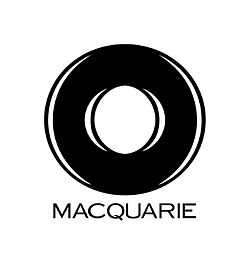Macquarie Bank Limited
 |
|
| Public | |
| Traded as | ASX: MQG |
| Industry | Financial Services |
| Founded | 1969 |
| Headquarters | 50 Martin Place Sydney, New South Wales Australia |
|
Area served
|
Worldwide |
|
Key people
|
Peter Warne (Chairman) Nicholas Moore (CEO) |
| Products | Asset management, Investment banking, Corporate banking, Private equity, Equities trading, Commodity trading, Futures and options trading, Foreign exchange trading, Money market trading, Consumer Banking, Wealth management, Investment Management |
|
|
|
|
|
|
| AUM |
|
|
Number of employees
|
|
| Capital ratio | 11.1% (2017) |
| Website | www |
Macquarie Group Limited is a global investment banking and diversified financial services group, providing banking, financial advisory and investment and funds management services to institutional, corporate and retail clients and counter-parties around the world. Headquartered in Sydney, Macquarie is the largest Australian investment bank and the top ranked mergers and acquisitions advisor in Australia.
Macquarie is listed in Australia (ASX:MQG) and is regulated by APRA, the Australian banking regulator, as the owner of Macquarie Bank Limited, an authorised deposit taker.
Macquarie was founded on 10 December 1969 as Hill Samuel Australia Limited, a subsidiary of the UK's Hill Samuel & Co. Limited.
Hill Samuel & Co. initially sought the advice of Sir John Marks, of Development Finance Corporation (DFC), regarding the establishment of an Australian subsidiary, however he suggested that Stan Owens instead be the one to compile a proposal for consideration. After presenting his report in London, Mr Owens was offered the role of implementing it by Hill Samuel's Chairman, Kenneth Keith, Baron Keith of Castleacre. Mr Owens became Executive Chairman of Hill Samuel Australia (HSA) and founded the company in Gold Fields House in Sydney's Circular Quay. The company's first three employees were Stan Owens, Blair Hesketh and Geoff Hobson Later Chris Castleman(on loan from the British parent) and Bill Clarke joined. David Clarke and Mark Johnson (both formerly of Darling & Co) were introduced to HSA and became joint Managing Directors. Despite being given a four-year allowance by the British parent to turn a profit, HSA was profitable by the end of its first twelve months of trading.
In 1971 HSA secured Australia’s biggest mandate at the time, a $US60 million financing for corrugated iron manufacturer John Lysaght Australia. HSA expanded its presence in the Australian market, opening a Melbourne office in 1972, and a Brisbane office in 1975. In 1979, HSA gained floor member status at the Sydney Futures Exchange.
...
Wikipedia
